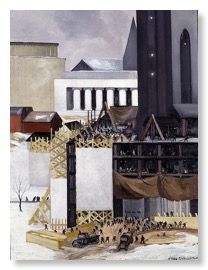Projects As Reflexive Systems

University Seminar on Reflexive Systems
Tuesday, January 18, 2011 from 10:00 am-12:00 pm
Funger Hall, Room 620
2201 G Street NW
PROJECTS AS REFLEXIVE SYSTEMS
David A. Schmaltz
What do you do when you don’t know what to do?
In our society and culture, we seem to start projects when we don’t know what else to do. Fewer than half of these ever finish. Of those that do finish, only a small percentage manage to satisfy anyone. Just last month, the OMB recommended that another raft of government-sponsored information technology projects be cancelled after expending tens of millions of dollars while producing nothing of discernible value. In private industry, no one reports just how sorry their project performance is. The truth would certainly panic the investing public.
The last fifty years has seen the greatest expansion in project management techniques in the history of the world, yet project performance is no better, and might well be worse. How could this be? This situation might reflect nothing but human nature; to pose a metaphor, then get trapped within it; to improve by insisting upon even more of the same perspectives that created the difficulty in the first place; to begin even more hopefully again, as if intention or will determined success. This seems to be what we’ve done when we didn’t know what to do. I believe we could do better.
In the early nineties, I worked for a boutique Silicon Valley consulting firm which had researched how successful, fast-time-to-market companies managed their projects. The findings revealed that none of these organizations managed their projects correctly—according to the civil engineering traditions that still underpin the dominant project management approaches—yet they consistently produced successful products in remarkably short time. How did they do this?
I believe they did this by attending to what was there, rather than what was supposed to be there. The research found common threads among these operations: they had shifted their metaphor governing their projects away from ‘scripted performance’ toward ‘conversation,’ away from fine prediction toward adaptation, and away from team toward community. Their projects operated more like human systems than mechanical ones. These shifts were subtle, and not reflected in consistent methods. Their projects looked and felt incredibly messy, and unlike their tidier, more established competitors, their projects achieved results faster and more consistently without mandated process consistency.
These shifts involved changing the perspective of those involved in the efforts, not finely determining how projects are supposed to work, but improving individual ability to see how they do work.
This presentation will, in the spirit of these insights, consider projects as reflexive systems by engaging in a conversation about project work. We will use our experience as the case study. I will bring my stories and invite you to share your stories as well. Expect to be delighted by what we discover together.


